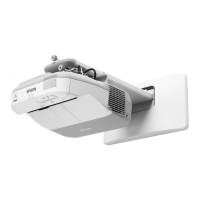Sub-menu Function
Abs. Color Temp.
(This item cannot be selected if Color Mode is set to
sRGB
g
.)
You can adjust the overall tint of the image. You can adjust tints
in 10 stages from 5000 K to 10000 K. The image is tinted blue
when a high value is selected and tinted red when a low value is
selected.
Advanced
(This item cannot be selected if Color Mode is set to
sRGB
g
.)
You can make adjustments by choosing the following items.
Gamma: You can adjust the coloring by selecting one of the
gamma correction values, or referring to the projected image or a
gamma graph.
RGB: You can adjust the individual R (red), G (green), and B
(blue) components of the offset and gain.
RGBCMY: You can adjust the hue, saturation, and brightness of
each color R (red), G (green), B (blue), C (cyan), M (magenta), Y
(yellow) individually.
Auto Iris
(This item can be set only if Color Mode is set to Dynamic,
Theatre, or Customized.)
Set to On to adjust the iris to obtain the optimum light for images
being projected.
The setting is stored for each Color Mode.
s "Setting Auto Iris" p.59
Reset
You can reset all adjustment values for the Image menu to their
default settings. See the following to return all menu items to
their default settings.
s "Reset Menu" p.163
Signal Menu
Settable items vary depending on the image signal and source currently
being projected. Setting details are saved for each image signal.
You cannot make settings on the Signal menu when the source is
Whiteboard, USB Display, USB1, USB2 or LAN.
s "Automatically Detect Input Signals and Change the Projected Image
(Source Search)" p.47
Sub-menu Function
Auto Setup
(Only available when analog RGB computer signals are being
input.)
Set to On to automatically adjust Tracking, Sync., and Position to
the optimum state when the input signal changes.
List of Functions
140

